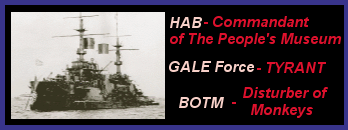Glocksman wrote:From an industrial standpoint, Germany would be stronger in 1943 than in 1939 or 1941. That's why I said it'd be more interesting.
Anyway, It'd depend upon the course of the war.
If we're talking about Germany in it's prewar borders attacking in 1943, of course the Red Army would defeat it eventually. Lack of resources would be Germany's undoing.
If we're talking about Germany, the master of continental Europe, attacking the USSR in a 'crusade against bolshevism' without having to worry about events in the west or in Africa, then the battle becomes much more equal without the diversion of German resources to defend against the bomber attacks or fighting in Africa.
My reference for all that follows is Paul Kennedy's
The Rise and Fall of the Great Powers, 1987 Random House. (a good book, if you're into economics and grand diplomacy)
Lack of resources was
already Germany's undoing as early as 1938. The thing that is often forgotten about the major Axis powers is that all three were red-lining their economies even before the war started, one of the major reasons for their expansionist drive. Hitler didn't grab everything he could lay hands on just because of Nazi pride, he desperately needed the influx of gold reserves and fresh resources to keep his ideology going. Around the time he took France, Germany's economy stopped being a self-defeating vacuum, but it was by no means the powerhouse you seem to think it would be.
At the same time, the contribution of the new territories in terms of real industrial expansion was negligable, and they actually reduced available German manpower. The Heer of 1941 represents roughly the maximum one-punch strength which could be achieved with Germany's economic base, and the assistence of the rest of the continent would not be Earth-shattering (unless you think the occupied territories are going to for some reason
massively beat the contribution they made in actual history).
Also, I don't think you quite understand the projected growth of Soviet military-industrial strength in the 1940-1945 period. In 1938 the USSR had about 18% of total world manufacturing output and was climbing rapidly, it furthermore had the largest untapped resource and manpower base in the industrialized world to expand upon. Meanwhile, Germany's share in '38 was about 13% of world output and further increase was unsustainable--in fact much of it's 1932-1938 increase in strength was due to the absorbtion of key Czech and Austrian industrial zones.
Adding the up the manufacturing share of soon-to-be occupied Europe as of 1938 brings Germany's total to equal or slightly exceed Soviet capacity; but this comparison is misleading. First because the foreign contribution to German industrial strength would not be nearly so efficient; second because the 1938 figures do not include the massive expansion of Soviet strength in the ensuing hypothetical 5 years of peace; third because a greater proportion of Western European industry was civilian as compared to the Soviet manufacturing (which was almost entirely heavy-industry oriented).
The Germans' lack of logistics combined with the immense distances? Or something else?
I think the USSR was beatable in a limited sense for a brief period; from about when German strength peak in late 1939, to when the Red Army would have completed it's recovery and Soviet industrial potential would have become overpowering in middle-late 1942. There's no point at which Hitler could have won the total victory that he hoped for, but he could have forced Stalin to the table and push the USSR's borders back to a comfortable area behind the Ukraine, Byelorussia, and Baltics.
...
MrAnderson:
If you care to debate me I would suggest that you actually do so instead of offering weak and baseless criticisms. I would respond to what you have so far contributed by pointing out a few things.
1) Soviet food production was capable of feeding their army and population (as it mostly did), the main problem was that this was primarily wheat and far less convenient for the troops than Spam. Industrial workers and troops would eat a little less well, but it would not be catastrophic on strength (and anyway Russian morale was almost impervious to food-related issues).
2) Heavy vehicle factories (which produced tractors and potentially tanks) could be converted for production of the ugly Soviet trucks. It would be somewhat trying and would reduce their tank production, but it would not be crippling.
3) A very large proportion of wartime Soviet production (Glantz tentatively believes it to be a
majority) came from new or speedily adapted factory complexes, as opposed to the traditional (propaganda) legend of it being mostly relocated factories. If the USSR anticipated a shortage of uniforms it would have ordered some of it's expansion to be devoted to making uniforms (and the resources for such things are most definitely there, Soviet Central Asia produced astronomical amounts of cotton)
...
And now I'm mentally fatigued.

Time to watch some mind-numbing TV.



